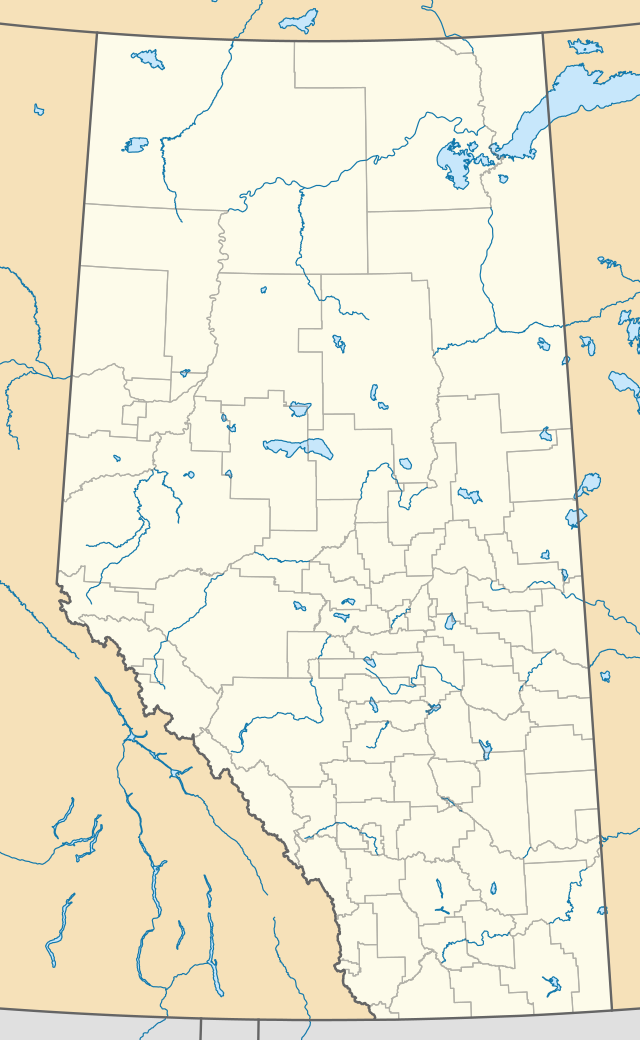Didsbury, Alberta
Didsbury is a town in central Alberta, Canada, at the foothills of the Rocky Mountains. It is located next to Alberta Highway 2A, near the Queen Elizabeth II Highway. Didsbury is within the Calgary-Edmonton corridor. Didsbury is approximately the half-way point between the cities of Calgary and Red Deer.
Didsbury | |
|---|---|
Town | |
| Town of Didsbury | |
 Didsbury railway station | |
 | |
 Didsbury Location of Didsbury in Alberta | |
| Coordinates: 51°39′57″N 114°07′52″W | |
| Country | |
| Province | |
| Region | Central Alberta |
| Census division | 6 |
| Municipal district | Mountain View County |
| Incorporated[1] | |
| • Village | December 24, 1901 |
| • Town | September 27, 1906 |
| Government | |
| • Type | Municipality |
| • Mayor | Rhonda Hunter |
| • CAO | Ethan Gorner |
| • Governing body | Didsbury Town Council |
| • MP | Blake Richards |
| • MLA | Nathan Cooper |
| Area (2016)[3] | |
| • Land | 16.37 km2 (6.32 sq mi) |
| Elevation | 1,037 m (3,402 ft) |
| Population (2016)[3] | |
| • Total | 5,268 |
| • Density | 321.7/km2 (833/sq mi) |
| Demonym(s) | Didsburian[5] |
| Time zone | UTC−7 (MST) |
| • Summer (DST) | UTC−6 (MDT) |
| Postal code span | T0M |
| Highways | Highway 2A Highway 582 |
| Waterway | Rosebud River |
| Website | Official website |
Didsbury is surrounded by Mountain View County, which has its municipal office located to the north of the town. The nearest neighbouring communities are the towns of Olds to the north and Carstairs to the south.
History
.jpg.webp)

The town is named after the township of Didsbury, now a suburban area of Manchester, England.[6] The first settlers were Dutch Mennonites who left their homes in Pennsylvania and emigrated as United Empire Loyalists to Waterloo County, Ontario. They were granted the area around Didsbury in 1894 by the government of Sir John A. Macdonald.[7]
Original settlement in the area was sparse, and this in part explains the initial slow development of the town-site as a service centre. The first concern of the Mennonite settlers was to build a church; and the primary task of the settlers was to create farmsteads. Settlement prior to the post-1900 land rush was limited to the small group who came west in 1894.
1897 saw the arrival of the Canadian Pacific Railway, which pushed forward the town's development. The CPR constructed a station in the town in 1904. Didsbury was incorporated as a village in 1905 and as a town on September 6, 1906.
Fires in 1914 and 1924 destroyed the early "boomtown" commercial streetscape and led to the passing by Town Council of a bylaw which required masonry construction for all new downtown commercial buildings. Many of these brick buildings stand today.
Demographics
In the 2016 Census of Population conducted by Statistics Canada, the Town of Didsbury recorded a population of 5,268 living in 2,031 of its 2,119 total private dwellings, a 6.3% change from its 2011 population of 4,957. With a land area of 16.37 km2 (6.32 sq mi), it had a population density of 321.8/km2 (833.5/sq mi) in 2016.[3]
In the 2011 Census, the Town of Didsbury had a population of 4,957 living in 1,923 of its 1,987 total dwellings, a 15.1% change from its 2006 adjusted population of 4,305. With a land area of 16.08 km2 (6.21 sq mi), it had a population density of 308.3/km2 (798.4/sq mi) in 2011.[8]
The population of the Town of Didsbury according to its 2008 municipal census is 4,599.[9]
Infrastructure
The town's recreational facilities include six parks, a golf course, aquatic centre, and a hockey rink. There is also a hospital and a Royal Canadian Mounted Police detachment serving the town and the surrounding area.
Didsbury has three schools that are under the jurisdiction of the Chinook's Edge School Division.
The Olds-Didsbury Airport, which is used primarily for small aircraft and general aviation, is located north of Didsbury along Highway 2A.
Media
The town is served by the Didsbury Review, which is part of the Great West Newspapers chain.[10]
Sport and recreation
Didsbury is home to the Mountainview Colts of the Heritage Junior B Hockey League.
Organizations
Organizations present in Didsbury include the Royal Canadian Army Cadets and the 1st Didsbury Scouts, Didsbury Jazzercise, as well as the Elks and Lions clubs.
References
- "Location and History Profile: Town of Didsbury" (PDF). Alberta Municipal Affairs. October 7, 2016. p. 197. Retrieved October 11, 2016.
- "Municipal Officials Search". Alberta Municipal Affairs. 2017-09-22. Retrieved 2017-09-25.
- "Population and dwelling counts, for Canada, provinces and territories, and census subdivisions (municipalities), 2016 and 2011 censuses – 100% data (Alberta)". Statistics Canada. February 8, 2017. Retrieved February 8, 2017.
- "Alberta Private Sewage Systems 2009 Standard of Practice Handbook: Appendix A.3 Alberta Design Data (A.3.A. Alberta Climate Design Data by Town)" (PDF) (PDF). Safety Codes Council. January 2012. pp. 212–215 (PDF pages 226–229). Retrieved October 8, 2013.
- "Mayor Rhonda Hunter Biography" (PDF). Town of Didsbury.
- "Didsbury History". Archived from the original on 2006-05-29. Retrieved 2006-06-22.
- Kinette Club of Didsbury (1969). Echoes of an Era. Didsbury, Alberta: Didsbury Booster.
- "Population and dwelling counts, for Canada, provinces and territories, and census subdivisions (municipalities), 2011 and 2006 censuses (Alberta)". Statistics Canada. 2012-02-08. Retrieved 2012-02-08.
- Alberta Municipal Affairs (2009-09-15). "Alberta 2009 Official Population List" (PDF). Retrieved 2010-09-14.
- Didsbury Review Newspaper site
External links
| Wikimedia Commons has media related to Didsbury, Alberta. |
| Wikivoyage has a travel guide for Olds and Didsbury. |